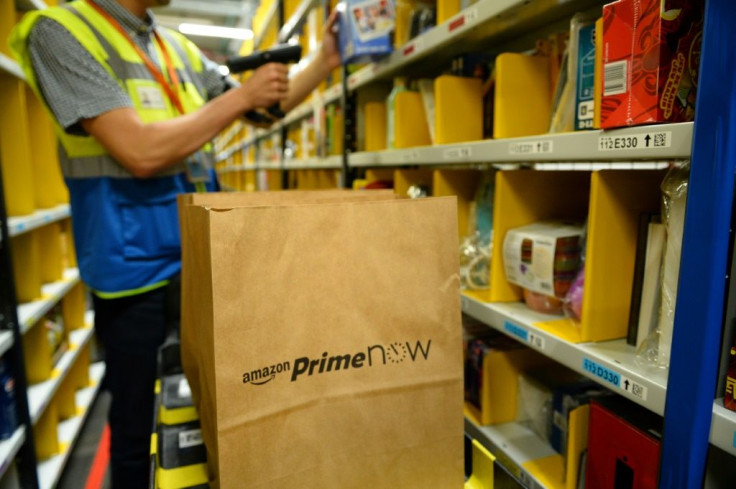What Is Amazon Doing To Communities? Report Looks At Tech Giant's Impact On Los Angeles Area

(This story has been updated)
The nonprofit research group Economic Roundtable reported Tuesday that Amazon, which has grown into a $1 trillion behemoth in its quarter century of operations, has had a major impact on a variety of industries and communities, not to mention employees, and not necessarily in a good way.
The report looked at Amazon’s impact on the Los Angeles area, both socially and economically.
The report, “Too Big to Govern,” comes as government regulators and state attorneys general are looking at whether the big tech companies should be broken up. Amazon’s portfolio has grown from books and music at its inception to encompass fresh groceries, electronics, neighborhood surveillance, professional services, healthcare, government procurement, internet infrastructure and entertainment – nearly every aspect of life.
Amazon sales are expected to hit $238 billion this year, and the company employs 750,000 people, 194,054 of them in tech hubs from Seattle to Atlanta, the report said.
The report notes Amazon “procures products and services from nearly every industry in the four-county region,” with the strongest ties to the real estate, information, shipping, waste management and entertainment sectors, and has received tens of millions in subsidies. Communities in which its warehouses are located, however, have received no sales tax benefits despite the pressures on infrastructure and the environment; rather, the revenue goes to cities in which the merchandise was ordered.
The report urges Amazon to raise its minimum wage to $20 an hour and to adjust it annually to make sure drivers, warehouse and logistics workers are earning a living wage. The mean annual wage for Amazon warehouse workers was $20,585 in 2017, roughly half of the living wage for the region, with 14% of warehouse workers living below the U.S. poverty threshold and 31% just above it, the report said. The U.S. poverty line in 2019 was $12,490 for an individual and $25,750 for a family of four. The Intercept reported Amazon is the biggest employer of Supplemental Nutrition Assistance Program recipients in five states.
“For every $1 in Amazon wages, warehouse workers receive 24 cents in public benefits, averaging $5,245 a year per worker,” the Economic Roundtable report said.
Employees outside its warehouse and delivery services earn an average $48,000 to $83,333, with the top salaries going to sales, marketing, management and related professional employees.
The report calls on Amazon to provide comprehensive, affordable health insurance for workers and their families, and to provide warehouse workers with adequate breaks and affordable, onsite childcare. Additionally, it calls on Amazon to invest in affordable housing in communities where its facilities are located.
Amazon estimates it added more than $4 billion to the Southern California economy in 2018, the report said, disputing the benefits since “Amazon’s thousands of blue-collar workers lack sustainable incomes and require public subsidies to survive.” It notes Amazon paid less than 3% of its $27 billion in profits in federal income taxes.
The report adds: “It’s time for Amazon to come of age and pay its own way. This means paying its full costs to the communities that host it and the workers who create its profits. Amazon will benefit when its workers have living incomes because they will have the buying power to purchase the products it sells.”
The report notes the bulk of Amazon sales come from wealthier communities while its warehouses and warehouse and delivery workers are in or from more marginal areas.
Amazon discounted the criticism, saying it comes from "self-interested critics, particularly unions and groups funded by our competitors."
"Amazon has invested more than $270 billion in the United States since 2011 and created more than 400,000 direct jobs in the U.S. and over 680,000 additional jobs in areas like construction, logistics, and other professional services," Amazon said in an emailed statement. "Amazon provides industry leading pay and benefits, including a $15 minimum starting wage, comprehensive healthcare coverage, five-months of maternity leave – and we’re investing $700 million to upskill 100,000 of our people to expand their skills and grow into new careers."
Amazon said it has given small businesses a chance to grow with it, adding it has paid all required taxes.
"It’s no coincidence to us that this group would emerge now because large shopping events have become an opportunity for our critics, including unions, to raise awareness for their cause – in this case, increased membership dues. These groups are conjuring misinformation to work in their favor, when in fact we already offer the things they claim to be able to provide,” the statement said.
© Copyright IBTimes 2024. All rights reserved.






















